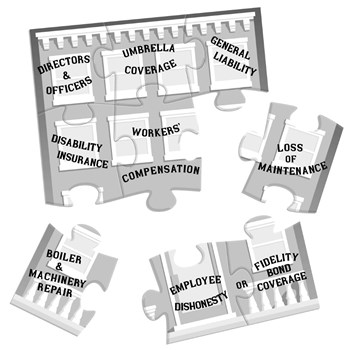
Insurance is a relatively simple concept that any homeowner can understand. You purchase a policy paying a premium to an insurer, and when a claim gets filed, the insurer pays. So in theory, insuring your co-op or condo building should be virtually the same principle—only on a larger scale, right?
Wrong. Insuring a building is a complicated, multi-layered process that board members should take seriously, and the proper amount of time to understand. Having the right kinds of insurance and the correct amount of coverage is extremely important for your building’s financial and physical well being. A solid understanding of what comprises a typical co-op or condo policy will help the board not only protect your unit owners and shareholders, but the all too important investment they’ve made in their homes.
The Right Package
Insurance coverage for your condo or co-op is made up of many components, beginning with property insurance, which as the name suggests, protects your physical property. According to Edward J. Mackoul, CIC, president of Mackoul & Associates Inc., an insurance brokerage with offices in New York and New Jersey, property insurance covers the outer structure, any damage caused to the building as well as any personal property owned by the association: tables, chairs, desks, conference room furniture, and outside patio furniture. It would also cover the income that the association cannot collect in case of a claim. “If there was a fire, for example, and a unit owner hasn't been paying the maintenance fee, the property coverage covers the income that the association is losing,” he says.
General liability is another piece of the package and it covers two main things, says Mackoul: bodily injury and property damage. Injury includes slips and falls—people getting injured and suing for damages, wherever they were on the premises or in the building. Property damage entails anything that the association has done that has caused harm or damaged someone else, such as a pipe bursting and subsequently leaking into and flooding several units.
Beyond that package, Barbara Strauss, executive vice president of York International Agency in Yonkers says buildings also need an employee fidelity or dishonesty bond, also called fidelity bond coverage, which according to Strauss, covers illegal conduct on the part of building employees, such as theft of money, security or property belonging to the condo or co-op association.
Strauss also stresses the importance of directors and officers or D&O coverage for board members—which protects them from liability in the course of doing their jobs as directors—worker’s compensation, and New York State disability coverage.
A Closer Look
According to Alnoor Ladha, the executive vice president of Vanderbilt Properties Insurance Brokerage, LLC, in Manhattan, the main components of a building policy are property, general liability, boiler and machinery, crime/fidelity, workers compensation and disability. Beyond those policies, Strauss and Ladha say buildings need the additional liability coverage that comes in the form of umbrella coverage.
Ladha says property insurance covers first-party losses while general liability covers third-party claims (which primarily arise in the form of slip-and-falls). A standard general liability policy provides about $1 million per occurrence, or $2 million in aggregate coverage.
“When you have a general liability policy and there’s one occurrence, somebody trips and falls, he or she would be able to claim up to $1 million,” according to Ladha. “If there are multiple occurrences, if two or three people fall within that policy period, then you have a limit of $2 million…that’s the maximum they will pay in a given policy period [for all slips and falls].”
Beyond that coverage, insurance companies also offer umbrella liability, which is additional liability coverage beyond the standard $1 million policy.
“If you have $1 million in primary general liability coverage, that only covers you for up to $1 million,” Ladha says. “In today’s litigious world, $1 million in coverage sometimes is not sufficient, because the legal fees alone can eat up the million-dollar limit. So we provide our clients with up to $200 million in excess umbrella coverage.”
That same principle applies to directors and officers coverage, which covers claims made against the board for mistakes or mismanagement. Generally speaking, Ladha says a building will have $1 million of coverage and can buy up to $200 million in umbrella coverage in addition to the initial D&O coverage.
“The umbrella is an excess liability policy,” adds Strauss. “It is an inexpensive way of increasing your liability limits over your general liability, which is your trip and fall coverage, and your directors and officers’ liability.”
Determining Cost
A lot of factors go into determining how much a building will pay for its coverage.
“It depends on the type of policy and then there are a number of factors,” says Mackoul. “One factor is the amount of coverage on the property side, you can be insured for $1 million or $100 million; the second factor is the number of units in the building, more units is more cost. Worker's comp is based on payroll and homeowners is based on the amount of coverage.”
Strauss adds that before 9/11, the industry was seeing some rate reductions, but terrorism concerns have resulted in rates going up. She adds that larger buildings may see bigger increases than smaller ones but overall, she says prices are staying pretty level.
“As of now, I think the market is pretty stable—I think prices are stabilizing,” she says. “I don’t think you’re going to see the big increases you saw years ago.”
Mackoul also stresses the importance of choosing coverage that is thorough and encompasses all aspects of your property, even if it means paying more in yearly premiums.
“One mistake that I see boards making is they don't get the right coverage,” says Mackoul. “The cheapest option isn't always the best one, so it's not best to look just at price. There are differences in types of policies. A board may see a $500 policy and a $1,000 policy, and they'll take the $500 one thinking it is the same, and it's not. A lot of times they don't base the decision on coverage.”
He recommends working with an agent who specializes in condo and co-op insurance. “Condo and co-op insurance is a niche market; you need to deal with a specialist.”
The Board’s Role
Both Strauss and Ladha say it’s important—if not vital—for board members to take an active role in learning about their building’s policy and understanding it.
“I think buildings should be aware of whether they’re carrying the proper amount of insurance,” says Strauss, “because they have a fiduciary responsibility to the shareholders. They should have someone come in and explain the insurance to them and make sure they are properly insured to value.”
One variable always is replacement cost. “If the building is undervalued and some damage happens…then you’ll have some serious problems—there wouldn’t be enough money from the insurance carrier to repair the building,” Ladha says. “So the board has to be very cognizant of the limits that the insurance policy will provide. It’s the same with the board’s directors and officers policy; these are unpaid volunteers, and if they don’t have enough D&O coverage, then a claim can be brought against them personally. They need to make sure they have a good D&O policy that will defend them against suits arising out of the decisions they make on behalf of the building.”
Strauss says that insurance companies provide boards with a schedule of insurance, which is a summary of all of the building’s coverage. The board should then review its building’s insurance with a broker to review the schedule. The insurance broker works with the board and/or manager and presents a proposal. Once the board approves a proposal, the broker writes the policy, which is then voted on by the board.
Building vs. Homeowner Coverage
Because they live in an apartment building, some condo owners and co-op shareholders may feel they don’t need homeowner’s insurance. This isn’t true. Just like any single family homeowner, condo and co-op owners need to have their own property insured via a homeowner’s policy.
“While the co-op and the condo association have insurance, that insurance doesn’t cover everything,” says Strauss. “That’s why it’s very important that the unit owners and the residents of the building have a homeowner’s policy. You own your own property—from the walls inward—and you have to take care of it.”
According to Ladha, when it comes to building insurance, there are essentially no differences between what a co-op building and a condo building need. However, the kind of coverage needed by the homeowner can be affected by whether or not he or she lives in a condo or a co-op. In a co-op, what the homeowner needs to have insured will be dictated by the building’s proprietary lease.
“The fundamental distinction is that with a co-op, a tenant shareholder owns shares,” Ladha says. “In a condominium, you own title and a deed to your unit. And that changes things considerably, because in a co-op the proprietary lease will dictate what some of the insurance will pay or not pay for [in an individual apartment]. In a condominium, you own the unit, and therefore there is no common lease that will help the homeowner.
“Generally speaking,” concludes Ladha, “the property coverage, the liability coverage, the boiler, the crime [fidelity], the directors and officers coverage for both condominiums and co-op corporation—all of these coverages are almost identical. The question then becomes where would you draw the line for who pays for what. It depends. In a co-op, the proprietary lease will dictate. If it’s a condominium then the unit owner is responsible, period.”
So whether you live in a co-op or a condo, having the right kind and amount of insurance is an essential ingredient that will provide some necessary peace of mind for you and your board.
Anthony Stoeckert is a freelance writer and a frequent contributor to The Cooperator. Editorial Assistant Maggie Puniewska contributed to this article.






Comments
Leave a Comment